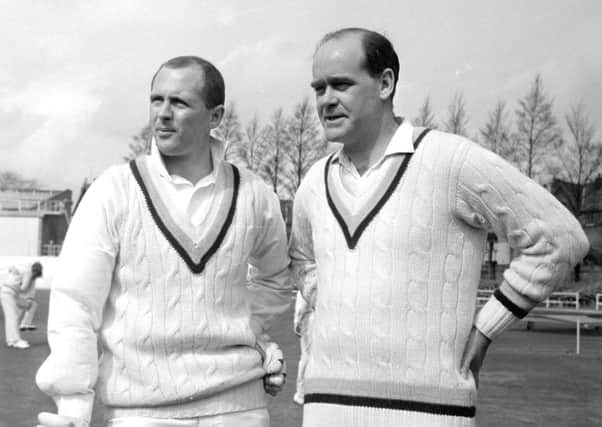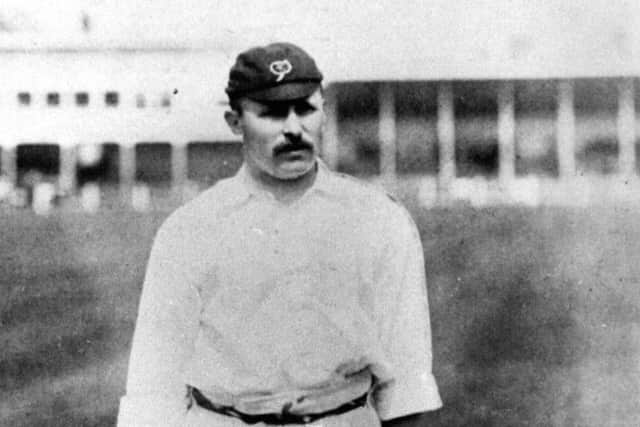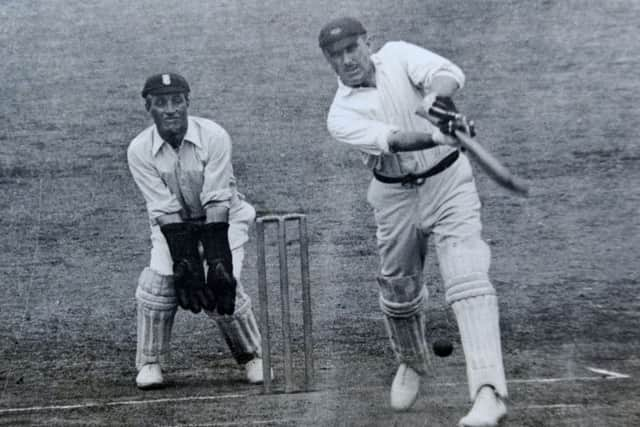Chris Waters: Why I wish I had been born in a different cricketing age


It is one I experience often as I pine for the good old days of ration books and outside toilets.
When it comes to cricket, I certainly think it would have been better if I had emerged kicking and screaming into the 1870s, say, as opposed to the 1970s.
Advertisement
Hide AdAdvertisement
Hide AdGranted, life expectancy then was around 40 years as opposed to 80 nowadays, but at least I would have been able to watch George Hirst and Wilfred Rhodes playing for Yorkshire before dying of Spanish flu and repairing to the great pavilion in the sky.
As debate intensifies following England’s Ashes defeat, with the county game once more under the microscope and blamed for all ills, the realisation dawns that the sport is becoming increasingly unrecognisable even to someone of my “tender” provenance.
“There is nothing permanent except change,” opined the Greek philosopher Heraclitus, and the old boy was clearly on to something fully 2,500 years before T20 changed the landscape of cricket forever, as surely as if it had been devastated by a nuclear bomb.
Now we even have T10 cricket, for heaven’s sake, as the sport continues along increasingly mystifying lines for the traditionalists among us, those who still retain the quaint idea that Test cricket is the pinnacle and all else is window dressing.
Advertisement
Hide AdAdvertisement
Hide AdSmall wonder that Geoffrey Boycott said recently that county cricket could die in 20 years, to which one might impishly retort: “You really think it will be as long as that, Geoffrey?”


Of course, people have been predicting the death of county cricket practically before it was even conceived, but even if it does not die in 20 years or so, one might argue that it is already deceased in a spiritual sense.
One does not have to be oblivious to the need for change to welcome change or to feel happy about the way that the game is heading.
The bottom line in cricket, as with so many things, is that change is underpinned by financial factors – and that basically means as much T20 as possible, and to hell with the consequences to the County Championship and, by extension, the Test team.
Advertisement
Hide AdAdvertisement
Hide AdAll protests to the contrary by administrators and club officials are as meaningless as players’ insistence that they want to play in lucrative T20 franchise competitions such as the Indian Premier League for the experience rather than humongous quantities of dosh; sorry, it is balderdash and bunkum, colossal humbug of the highest order.


The game is now in such a confused and complicated state, with multi-formats and fixture chaos, that one sympathises with the well-meaning administrators out there who are reacting to the times by recognising the truth that if they did not embrace T20, county cricket would almost certainly die if they simply sat on their hands and did nothing.
Debt-ridden counties cannot afford to take such a romantic view as yours truly, for it would be tantamount to professional suicide.
Alas, the damage has already been done through the gradual erosion of the Championship over many years, with the format out-of-step with a fast-paced modern society that resonates to a much greater extent with T20.
Advertisement
Hide AdAdvertisement
Hide AdAs one Yorkshire player of the 1950s put it to me once: “Cricket, in a traditional sense, is being systematically destroyed, and there is absolutely nothing we can do to turn back the clock.”


Although said confidant still loves the game and never misses a Test match on television, his point is that for all the admirable elements of T20 and one-day cricket, the inventive strokeplay, the quite breathtaking fielding (much better than in his day), the time-honoured attractions of the Championship and Test cricket are effectively hanging on by a thread as opposed to setting the agenda.
It is why, for all that I respect the views of Yorkshire chief executive Mark Arthur and director of cricket Martyn Moxon, I consider their recent proposal that the Championship should be split into three conferences of six teams, and then split into another three conferences of six teams two-thirds of the way through the season depending on points gained, to be a well-argued but ultimately futile effort to make the best of what is already an irredeemably bad job.
Indeed, if you think about it, there is absolutely nothing wrong with the original concept of one division with the counties playing each other home and away over three or four days on covered or uncovered pitches, which is how it used to be.
Advertisement
Hide AdAdvertisement
Hide AdIt is only the inexorable proliferation of international games, one-day matches and T20 games that has brought us to a state of affairs where the Championship is clearly not properly preparing players for Test cricket, shoehorned, as it is, into the margins of the season and assisting the development of neither pace bowlers nor spinners, with the tournament shorn of top England players and high-class overseas stars that would help lift the standard and, consequently, young English players to better compete on the world stage.
I repeat, the game is already complicated enough without adding to the conundrum, and for all the bloated nature of professional football, at least that is one charge that could not be levelled at our winter sport – albeit with its solitary format.
If you are looking for magic solutions, you will not find them here, although that is not to say there are no solutions.


Why, the solutions are self-evident in the ideal world from which I write – play fewer international matches, return the Championship more to how it was, embrace T20 but do not overcook the golden goose and make ‘balance’ the watchword at all times, ensuring that all tastes are catered for. Of course, it is a bit like calling for world peace – an ultimately futile clarion call.
Advertisement
Hide AdAdvertisement
Hide AdBut, in this ideal world, do you know what I would really like to see? I would like to see a Championship that could produce the romance of another 10 for 10, of gripping duels on old sticky dogs, of challenges to batting and bowling technique no longer possible on covered pitches to make the game more exciting, and I would like to visit out-grounds that have fallen by the wayside in the name of progress, not least here in Yorkshire, instead of viewing each year’s fixture list with never a new ground in sight.
Like the old Yorkshire player of the 1950s, I still love the sport and marvel at the incredible innovations brought about by white-ball cricket, but, first and foremost, I love “proper” cricket – which is to say, Test cricket and the Championship.
However, as I said at the outset, I rather fear that I may have been born in the wrong era and, if you would kindly excuse me dear reader, I really must nip to the outside toilet ...